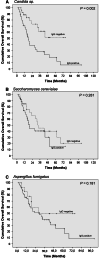Serum IgG against Candida predict survival in patients with metastatic renal cell carcinoma
- PMID: 20182873
- PMCID: PMC11031116
- DOI: 10.1007/s00262-010-0827-z
Serum IgG against Candida predict survival in patients with metastatic renal cell carcinoma
Erratum in
- Cancer Immunol Immunother. 2010 Aug;59(8):1149
Abstract
Background and aim: In contrast to hematologic malignancies, little is known about the role of fungi in the development and progression of solid tumors. This prompted us to analyze and correlate serum levels of different fungal IgG with survival of patients with metastatic renal cell carcinoma.
Patients and methods: Serum IgG to Candida sp., Saccharomyces cerevisiae and Aspergillus fumigatus were measured in a cross-sectional study in 64 patients with advanced disease. Univariate and multivariate analyses were chosen to study serum IgG as prognostic indicators.
Results: Median follow-up was 29.0 months (range 0.3-122). Median overall survival of patients, which tested negative for Candida IgG, was significantly increased (median not reached, >29 months) compared with Candida IgG positive patients (17.8 months, P = 0.002). Median survival of Saccharomyces IgG negative patients was 33.1 months as opposed to 19.4 months in Saccharomyces IgG positive patients, although this difference was not significant (P = 0.281). No difference in overall survival was found between Aspergillus IgG positive patients (28.0 months) and Aspergillus IgG negative patients (29.1 months) (P = 0.181). Cox backward-stepwise regression confirmed Candida IgG as the strongest predictor of survival in metastatic renal cell carcinoma patients (risk ratio 3.27, P = 0.001, [95% CI 1.86-5.73]).
Conclusion: Our findings suggest that IgG antibodies directed against yeast fungi and particularly against Candida but not against mold fungi have prognostic relevance.
Figures

Similar articles
-
Serum antibodies against Saccharomyces cerevisiae: a new prognostic indicator in metastatic renal-cell carcinoma.Cancer Immunol Immunother. 2008 Aug;57(8):1207-14. doi: 10.1007/s00262-008-0454-0. Epub 2008 Mar 6. Cancer Immunol Immunother. 2008. PMID: 18322685 Free PMC article.
-
Diagnostic value of immunoglobulin G antibodies against Candida enolase and fructose-bisphosphate aldolase for candidemia.BMC Infect Dis. 2013 May 31;13:253. doi: 10.1186/1471-2334-13-253. BMC Infect Dis. 2013. PMID: 23725337 Free PMC article.
-
Decoding serological response to Candida cell wall immunome into novel diagnostic, prognostic, and therapeutic candidates for systemic candidiasis by proteomic and bioinformatic analyses.Mol Cell Proteomics. 2006 Jan;5(1):79-96. doi: 10.1074/mcp.M500243-MCP200. Epub 2005 Sep 28. Mol Cell Proteomics. 2006. PMID: 16195222
-
Prediction of the clinical outcome in invasive candidiasis patients based on molecular fingerprints of five anti-Candida antibodies in serum.Mol Cell Proteomics. 2011 Jan;10(1):M110.004010. doi: 10.1074/mcp.M110.004010. Epub 2010 Sep 21. Mol Cell Proteomics. 2011. PMID: 20860995 Free PMC article.
-
Identification of Disease-Associated Cryptococcal Proteins Reactive With Serum IgG From Cryptococcal Meningitis Patients.Front Immunol. 2021 Jul 23;12:709695. doi: 10.3389/fimmu.2021.709695. eCollection 2021. Front Immunol. 2021. PMID: 34367172 Free PMC article.
Cited by
-
The mycobiome in human cancer: analytical challenges, molecular mechanisms, and therapeutic implications.Mol Cancer. 2025 Jan 15;24(1):18. doi: 10.1186/s12943-025-02227-8. Mol Cancer. 2025. PMID: 39815314 Free PMC article. Review.
References
-
- Motzer RJ, Mazumdar M, Bacik J, Berg W, Amsterdam A, Ferrara J. Survival and prognostic stratification of 670 patients with advanced renal cell carcinoma. J Clin Oncol. 1999;17:2530–2540. - PubMed
Publication types
MeSH terms
Substances
LinkOut - more resources
Full Text Sources
Medical

